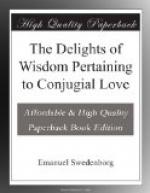were asked, “What is the quality of those delights?”
They said, “To the senses of others they are
like the stinks arising from dunghills, the stenches
from dead bodies, and the scents from stale urine.”
And it was asked them, “Are those things delightful
to you?” They said, “Most delightful.”
And reply was made, “Then you are like unclean
beasts which wallow in such things.” To
which they answered, “If we are, we are:
but such things are the delights of our nostrils.”
And on being asked, “What further account can
you give?” they said, “Every one is allowed
to be in his delight, even the most unclean, as it
is called, provided he does not infest good spirits
and angels; but since, from our delight, we cannot
do otherwise than infest them, therefore we are cast
together into workhouses, where we suffer direfully.
The witholding and keeping back our delights in those
houses is what is called hell-torments: it is
also interior pain.” It was then asked them,
“Why have you infested the good?” They
replied, that they could not do otherwise: “It
is,” said they, “as if we were seized with
rage when we see any angel, and are made sensible
of the divine sphere about him.” It was
then said to them, “Herein also you are like
wild beasts.” And presently, when they
saw the novitiate spirit with the angel, they were
overpowered with rage, which appeared like the fire
of hatred; wherefore, in order to prevent their doing
mischief, they were sent back to hell. After
these things, appeared the angels who from ends see
causes, and by causes effects, who were in the heaven
above those three companies. They were seen in
a bright cloud, which rolling itself downwards by
spiral flexures, brought with it a circular garland
of flowers, and placed it on the head of the novitiate
spirit; and instantly a voice said to him from thence,
“This wreath is given you because from your
childhood you have meditated on heaven and hell.”
* * * *
*
ON CONCUBINAGE.
462. In the preceding chapter, in treating on
fornication, we treated also on keeping a mistress;
by which was understood the connection of an unmarried
man with a woman under stipulated conditions:
but by concubinage we here mean the connection of
a married man with a woman in like manner under stipulated
conditions. Those who do not distinguish genera,
use the two terms promiscuously, as if they had one
meaning, and thence one signification: but as
they are two genera, and the term keeping a mistress
is suitable to the former, because a kept mistress
is a courtezan, and the term concubinage to the latter,
because a concubine is a substituted partner of the
bed, therefore for the sake of distinction, ante-nuptial
stipulation with a woman is signified by keeping a
mistress, and post-nuptial by concubinage. Concubinage
is here treated of for the sake of order; for from
order it is discovered what is the quality of marriage
on the one part, and of adultery on the other.




